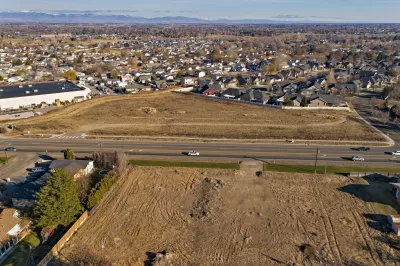A comprehensive update of the city’s zoning code aimed at making housing more affordable and promoting sustainable growth received unanimous support from the city council.

“After three days of public testimony and more than four years of work, the Boise City Council unanimously approved its new zoning code,” reports Margaret Carmel in Boise Dev, marking the first update to the city’s 60-year-old zoning code.
The code change increases density allowed along major transit corridors and in neighborhoods, as long as a project is affordably priced or has sustainability components, and cuts parking requirements and much more.
Among the hottest topics discussed were the length of deed restrictions for affordable housing, which was cut from 50 years to 20, and accessory dwelling units (ADUs). “Requirements for when neighbors are notified about projects was another hot topic during public testimony. One of the changes to the code draft staff suggested allows immediate neighbors to be notified after certain types of projects – known as Type 2 – are approved.”
The rewrite also scales up bike parking requirements, permits large trees in some landscape buffers, allows daycares in any mixed-use zone, and lets businesses apply for a variance to reduce parking.
See the source article for a more complete list of changes in the zoning code, which will go into effect on December 1, 2023.
FULL STORY: Boise’s future: Council unanimously adopts zoning code revamp, with changes: ‘a home… is fundamental’

Maui's Vacation Rental Debate Turns Ugly
Verbal attacks, misinformation campaigns and fistfights plague a high-stakes debate to convert thousands of vacation rentals into long-term housing.

Planetizen Federal Action Tracker
A weekly monitor of how Trump’s orders and actions are impacting planners and planning in America.

In Urban Planning, AI Prompting Could be the New Design Thinking
Creativity has long been key to great urban design. What if we see AI as our new creative partner?

Portland Raises Parking Fees to Pay for Street Maintenance
The city is struggling to bridge a massive budget gap at the Bureau of Transportation, which largely depleted its reserves during the Civd-19 pandemic.

Spokane Mayor Introduces Housing Reforms Package
Mayor Lisa Brown’s proposals include deferring or waiving some development fees to encourage more affordable housing development.

Houston Mayor Kills Another Bike Lane
The mayor rejected a proposed bike lane in the Montrose district in keeping with his pledge to maintain car lanes.
Urban Design for Planners 1: Software Tools
This six-course series explores essential urban design concepts using open source software and equips planners with the tools they need to participate fully in the urban design process.
Planning for Universal Design
Learn the tools for implementing Universal Design in planning regulations.
Gallatin County Department of Planning & Community Development
Heyer Gruel & Associates PA
JM Goldson LLC
City of Camden Redevelopment Agency
City of Astoria
Transportation Research & Education Center (TREC) at Portland State University
Jefferson Parish Government
Camden Redevelopment Agency
City of Claremont





























